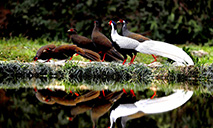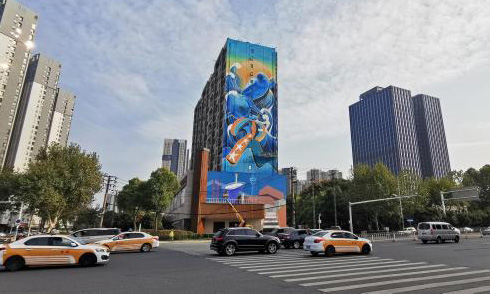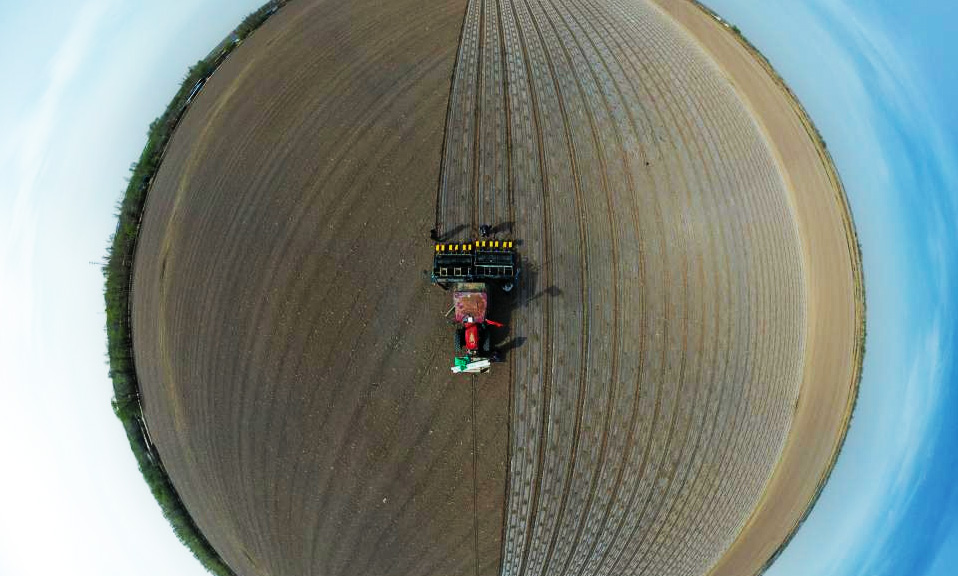From vets to common people, collective endeavor toward wildlife protection
BEIJING, April 25 (Xinhua) -- Liu Lijun describes himself as an "emergency physician" who is tending to "patients" in need of urgent remedies.
"This white ball python, sent by the local residents, has a spine injury and is undergoing treatment here," said the 38-year-old veterinarian, who works at Beijing Wildlife Rescue and Rehabilitation Center, as he injected nutrients and antibiotics into the snake.
"The number of injured and trapped animals has seen a rise every year from hundreds to thousands, and dozens of animals are sent in a single day during the busiest times," Liu said. The data only takes into account those sent by citizens, excluding illegally raised and trafficked animals, which are forfeited and brought to the center by the police.
The surge in the number of rescue instances demonstrates the increasing awareness of wildlife rescue and habitat rehabilitation among Beijingers, Liu added.
The theme of Earth Day 2022, which fell on April 22, was "Invest In Our Planet." This year marks the 53rd anniversary of Earth Day and the initiative calls for forging a partnership toward safeguarding the planet where everyone is accounted for, and everyone is accountable.
WILDLIFE RESCUE
"Wildlife protection is my passion and it gives me an extraordinary sense of achievement," said Liu, explaining that his routine tasks include conducting a preliminary diagnosis and forming medical treatment plans for the animals.
Over the past 10 years, Liu has treated more than 8,000 wildlife. Animals are usually released into the forests of Beijing upon recovery but when it comes to migratory birds, Liu and his colleagues wait for the appropriate season.
From 2016 to 2020, the wildlife center spanning 16 hectares had received 21,432 wild animals, including 19,075 birds, 963 reptiles, 797 mammals, 38 arthropods and 31 amphibians.
"Birds are in majority because Beijing is an important migration route for them," Liu said. According to the latest survey, the Chinese capital has more than 503 bird species, the proportion of which surpasses a third of the country.
When locals spot birds in distress, most residents would send them to the wildlife care center for treatment. Such occurrences are common during spring and autumn, the migration seasons. The center has also established a breeding platform and set up numerous aid stations in wildlife habitats.
There are two types of veterinarians in the center. Experimental vets are in charge of analyzing death cases and collecting blood, feces, and biopsy samples, while clinical vets manage the treatment plans for animals.
While the majority of the wildlife is released into the forest, a small proportion of animals are used for scientific research and demonstration. The non-local ones are sent back to their original habitats, and those deemed incapable of survival following injuries are kept in the zoo under proper care.
HABITAT REHABILITATION
In comparison to purely treating the creatures, habitat rehabilitation increases the benefits of wildlife protection.
"Hundreds or even thousands of wild animals I rescue every year seems to be an enormous amount, but in reality, it is just a drop in the bucket considering countless wildlife species are suffering in Beijing as well as the rest of the country," Liu said.
He hopes that the unremitting efforts of vets in treating animals can enhance the public awareness of wildlife protection and habitat rehabilitation.
According to the local forestry and park authority, Beijing's urban green spaces and wetland areas have increased by 3,773 hectares and 11,000 hectares, respectively, during China's 13th Five-Year Plan period (2016-2020).
A variety of birds such as black storks, great bustards, mallards, and herons choose Beijing as their habitat. There are currently 79 nature reserves in the Chinese capital, occupying 368,000 hectares of area.
"The public's consciousness toward habitat rehabilitation will save more wildlife than clinical vets," Liu said, adding that the joint efforts of the entire society will contribute to the protection of the earth's ecology and environment.
Photos
 World Book Day: Let's read together
World Book Day: Let's read together Rare silver pheasants flock together in greater numbers to forage at Yishan nature reserve in east China's Jiangxi
Rare silver pheasants flock together in greater numbers to forage at Yishan nature reserve in east China's Jiangxi Young artist takes up brush to create lifelike paintings expressing mankind and nature’s harmonious co-existence
Young artist takes up brush to create lifelike paintings expressing mankind and nature’s harmonious co-existence Cutton farming in full swing in China's Xinjiang
Cutton farming in full swing in China's Xinjiang
Related Stories
Copyright © 2022 People's Daily Online. All Rights Reserved.






